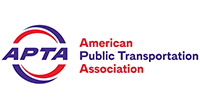
Tactile Wayfinding in Transportation Settings for Travelers Who Are Blind or Visually Impaired
Report Number: R-248
Publication Date: 04/12/2024
Travelers who are blind or visually impaired use a variety of cues and strategies to orient themselves within their surroundings and move through space to where they want to go. This wayfinding process can be particularly challenging in complex urban environments where some cues, such as detectable edge treatments, the sound of surging parallel traffic, or other indicators may be inconsistent, confusing, misleading, or missing.
This report seeks to help provide consistency of tactile walking surface indicators and guidelines for their use in multimodal environments.

Paratransit Fleet Configurations
Report Number: S-174
Publication Date: 03/01/2024
The increase in the population of older adults who are ambulatory but are eligible to use paratransit has increased the demand for paratransit service delivery. This growth has, in turn, led some transit agencies to move away from standard one-vehicle type fleets in favor of a mixed fleet incorporating smaller accessible vehicles and non-accessible vehicles (generally sedans).
This report focuses on the different ways that transit agencies have configured their dedicated paratransit fleets. The first wave of fleet configuration changes has provided some expected benefits of lower operating costs and greater service delivery flexibility due to incorporating smaller vehicles into the fleet mix. These changes have also brought forward a set of service delivery issues, including increased costs, maintenace concerns, and complications in the reassignment of riders.

Mental Health, Wellness, and Resilience for Transit System Workers
Report Number: R-245
Publication Date: 02/23/2024
Transit agency leadership must make a real and concerted effort to take the mental health and overall wellness of frontline workers more seriously. Leadership can play an important role by making a clear commitment and dedicating resources to address mental health, wellness, and resiliency at their agencies. Ultimately, this means that more funding and staff resources are needed to address barriers and to develop, implement, and support programs aimed at improving mental health, wellness, and resiliency. This includes staff dedicated to implementing and monitoring holistic wellness programs.
This report provides a detailed summary of common factors that influence the mental health, well-being, and resiliency of frontline transit workers and includes a range of solutions that transit agencies can implement to address them. Findings were determined using a mix of research methods, including multiple interviews and focus groups with frontline employees, transit agency management, and union leadership at two different points in the project.
Supplemental to the report are a Research Brief and an Implementation Plan.

Transformational Technologies and Mobility Inclusion Playbook
Report Number: R-244
Publication Date: 04/04/2024
Changes in technology provide opportunities and risks to mobility, particularly as they relate to traditionally and newly underserved populations. In recent years, economic, environmental, and social forces have quickly given rise to shared and on-demand mobility—a collective of entrepreneurs and consumers leveraging technology to maximize transportation and financial resources and generate capital. For instance, shared mobility services have become part of a trend that has pushed shared, on-demand mobility from the fringe into the mainstream.
This report is a playbook of resources for public and private entities to assess, plan, and measure their progress toward achieving transportation equity and inclusive mobility in an era of transformational technology.
Supplemental to the report are a Research Background and Appendix B: Stakeholder Interviews,Appendix C: Underserved Population Focus Groups, and Appendix D: Underserved Population Survey.

Transportation for People with Disabilities and Older Adults During COVID-19: Lessons for Emergency Response
Report Number: R-243
Publication Date: 02/09/2024
The COVID-19 pandemic left many persons with disabilities and older adults without reliable transportation to access essential goods, medical care, and social engagements. Issues of social isolation for older adults were exacerbated with the emergence of COVID-19 because transportation service was reduced.
This report aims to provide transportation organizations (including transit agencies, specialized transportation providers, and other local government agencies and stakeholders) with helpful information and strategies on providing service for persons with disabilities and older adults in emergency situations.

Homelessness: A Guide for Public Transportation
Report Number: R-242
Publication Date: 01/12/2023
Unemployment, low wages, poverty, and lack of affordable housing are the main drivers of an increasing homeless population throughout the U.S. in recent years. Transit agencies are being impacted by homelessness. While transit agencies cannot address the underlying causes of homelessness, there are opportunities to work with local partners to be a part of helping individuals in need, while providing a safe, reliable, and customer-friendly experience for all riders.
This final report presents transit agency experiences and lessons learned as they have built on, newly implemented, or are considering programmatic activities that respond to homelessness.

Transportation for People with Disabilities and Older Adults During COVID-19: Lessons for Emergency Response
Report Number: R-243
Publication Date: 10/10/2023
The COVID-19 pandemic left many persons with disabilities and older adults without reliable transportation to access essential goods, medical care, and social engagements. Issues of social isolation for older adults were exacerbated with the emergence of COVID-19 because transportation service was reduced.
This pre-publication report aims to provide transportation organizations (including transit agencies, specialized transportation providers, and other local government agencies and stakeholders) with helpful information and strategies on providing service for persons with disabilities and older adults in emergency situations.
Supplemental to the report is a pocket guide.




